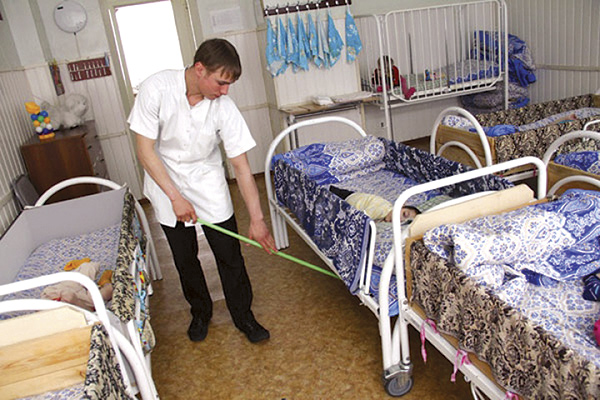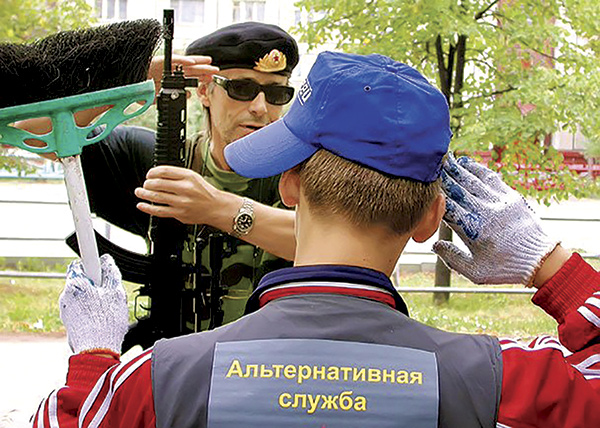New law on alternative civilian service came into force on July 1st, 2016
Responsibility, as in the army
You cannot? Prove it!
Young people wishing to avoid military service due to religious beliefs can now serve in civilian posts instead, as originally enshrined in the Belarusian Constitution, and now detailed in a corresponding law. Of course, some people may cite religious beliefs falsely, to avoid military service, so any statement must be proven. Civilian service is to last three years (twice the time required of regular military conscripts) while those with higher education must give two years of service.
A list of organisations where alternative civilian service may be performed is being drawn up by the Ministry of Labour and Social Protection: nursing facilities, hospices, residential care homes, housing and communal enterprises, agriculture and forestry (all places in need of labour and where earnings tend to be low).
The Minister of Defence of the Republic of Belarus, Andrei Ravkov, has a negative attitude towards offering alternative civilian service, believing the option is completely separate from the Armed Forces, rather falling under the mandate of the Ministry of Labour and Social Protection.
A hundred men all over the country
Those drafting the law have come under criticism, with opponents believing that other reasons are valid for alternative service, such as pacifism and other philosophies beyond ‘religious faith’. The Head of the Legal Department of the Ministry of Labour and Social Protection, Olga Likhtarovich, tells us, “We must proceed from the fact that it shouldn’t be more attractive to undertake alternative civilian service than military service. Otherwise, we’ll face too many unfounded appeals from citizens wishing to simplify life.”
Those undertaking alternative civilian service should be in the minority, notes the Chairman of the Standing Commission on Labour and Social Affairs of the House of Representatives, Vladimir Vasilenko. He states that, each year, no more than a hundred people are likely to undertake alternative civilian service countrywide.
WORD-FOR-WORD
Leonid Gulyako, the Commissioner for Religious and Ethnic Affairs of the Republic of Belarus:
For most confessions, alternative civilian service is probably not relevant. Nevertheless, such questions arise. Even if we’re talking about very few people, they are still human beings. They want to know their place in relation to this law in terms of their rights as people of faith.
By Anton Veremeev
Concrete terms
Where unusual recruits are awaited
The Mogilev Region, along with others, has filed a list of companies and organisations with the Ministry of Labour and Social Protection of the Republic of Belarus, denoting where labour is required.

A variant of alternative civil service
“This list contains more than fifty organisations: district hospitals, public utilities, dairy farms and forestry enterprises,” says the Head of the Labour, Employment and Social Protection Committee of the Mogilev Regional Executive Committee, Yelena Yakovleva. “Young men can prove helpful while gaining skills.”
Soon, we’ll learn which organisations will receive such recruits, a list becoming available to the public.
“Such labour will be very useful,” says the Director of the Neuropsychiatric Orphanage in Bykhov, Zinaida Prokopovich. “We’re talking about strong young men. It’s much easier for them to help a sick person get up or sit in a wheelchair than for a nurse. We have about two hundred patients with impaired motor functions. Care of sick and elderly patients also has an educational factor and requires warm-heartedness. Recruits should understand that they can’t opt out. They should be thorough in their efforts and work with full dedication. We’ll keep an eye on that.”
By Svetlana Markova
Following Austrian way
The world knows two basic models of alternative service. The first involves signing an employment contract between the ‘alternative servant’ and the organisation, with all relations between them following the employment and labour law. Russia, Ukraine and Moldova use this model. Belarus uses the second model, whereby young men choosing an alternative civilian service, according to their legal status, are almost conscripts, as in Austria.
Recently, the Council of Ministers issued a list of works for those choosing alternative civilian service. Apart from traditional activities, like washing floors in hospitals, or taking care of seriously ill and disabled people, a conscript may be involved in growing or harvesting vegetables, berries or mushrooms, mowing grass, or caring for cattle.
The monthly financial allowance is 150 percent of the maximum value of the minimum living wage for the last two quarters (currently, per capita,169.94 Belarusian Roubles). Next year, the financial allowance will increase by 20 percent, and, by 2018, by 40 percent.
By Olga Korneeva












